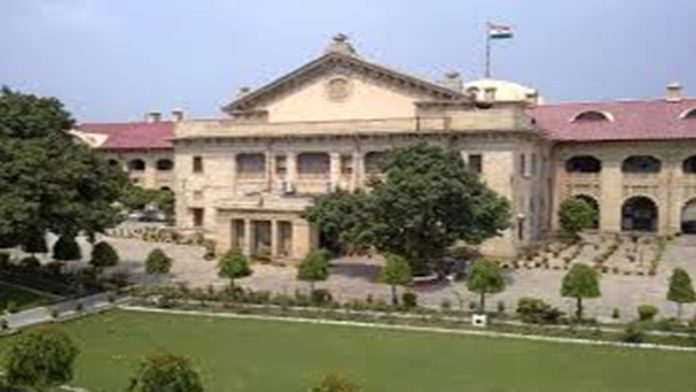The Allahabad High Court has rejected the bail application of a Muslim person accused of having made videos of the informant/victim and was blackmailing her and she was being forced to accept Islam, and also to eat nonvegetarian foods.
A Single Bench of Justice Rohit Ranjan Agarwal passed this order while hearing a Criminal Misc Bail Application filed by Ajeem.
By means of the application, applicant, who is involved in Case under Sections 323/504/506 IPC and Section 3/5(1) U.P Prohibition of Unlawful Conversion of Religion Act, 2021, Police Station Kotwali, District Budaun, seeks enlargement on bail during the pendency of trial.
The prosecution story is that the applicant had made videos of the informant and was blackmailing her. He had sexually exploited the informant and was pressuring her to marry him. The informant was living with the applicant and she was being forced to accept Islam, and also to eat nonvegetarian foods. She was also asked to wear clothes as worn by Muslims.
Counsel for the applicant has submitted that he has been falsely implicated in the case and the informant was in love with the applicant and she had left on her own. Earlier, an FIR was registered as Case in which the statement under Section 161 CrPC was recorded wherein she had admitted the fact that she had solemnized marriage with the applicant.
Counsel further submitted that in a statement recorded under Section 164 CrPC in Case she had stated that marriage was solemnized between the applicant and informant.
Counsel for the applicant next contended that the applicant is languishing in jail since 27.06.2023, deserves to be released on bail. In case, the applicant is released on bail, he will not misuse the liberty of bail and shall cooperate with trial.
AGA while opposing the bail application submitted that the statement of girl which was recorded under Section 164 CrPC, in the case, clearly reveals that she was being coerced to accept Islam and she had further stated in her statement that without any conversion her Nikah ceremony was performed with the applicant and further on the day of Bakrid, father-in-law had asked the informant to come and see how sacrifice was given, which she has refused to see.
Having heard counsel for the parties and on perusal of material on record, it is clear that the informant in her statement recorded under Section 164 CrPC had categorically stated that the applicant and his family members were coercing her to accept Islam and she was also being forced to witness the animal sacrifice, which was being done on the day of Bakrid and also to cook and eat non-vegetarian foods, the Court observed.
The Court noted that,
The UP Prohibition of Unlawful Conversion of Religion Act, 2021 received the assent of the Governor on 04.03.2021 and was published in the government gazette on 05.03.2021. The basic object and reason of the enforcement of the Act was to guarantee religious freedom to all persons which reflects the social harmony and spirit of India. The objective of this Act was to sustain the spirit of secularism in India. According to the Constitution, the State has no religion and all religions are equal before the Date, and no religion shall be given preference over the other. All persons are free to preach, practice and propagate any religion of their choice.
The Constitution confers on each individual the fundamental right to profess, practice and propagate his religion. However, the individual right to freedom of conscience and religion cannot be extended to construe a collective right to proselytize, the right to religious freedom belongs equally to the person converting and the individual sought to be converted.
Section 2 (a), (b), (c) and (d) of the Act of 2021 defines “allurement” “coercion” “conversion” and “force”. According to the aforesaid definition ‘allurement’ means and includes an offer for any temptation in any form, ‘coercion’ means compelling an individual to act against his/her will by the use of psychological pressure or physical force causing bodily injury or threat thereof. Similarly, ‘conversion’ means renouncing one’s own religion and adopting another religion. ‘Force’ has been defined to include a show of force or a threat of injury of any kind to the person converted or sought to be converted. Section 3 protects conversion from one religion to another religion by misrepresentation, force, fraud, undue influence, coercion and allurement.
Punishment for contravention of Section 3 has been provided under Section 5. However, Section 7 provides for the offence to be non-bailable and cognizable. Section 8 prescribes a method for declaration before conversion of religion and pre-report about conversion. According to it, one who desires to convert his/her religion, shall give a declaration in the form prescribed in schedule (i) at least 60 days in advance to the District Magistrate or Additional District Magistrate specially authorized by the District Magistrate that he wishes to convert his/her religion on his/her own and with his/her free consent and without any force, coercion, undue influence or allurement.
“In the case, the informant is the victim herself and she has lodged the FIR alleging that she was being coerced to accept Islam by the applicant and his family members. She was kept in captivity by the applicant and was being forced by his family members to perform certain Islamic rituals, which was not acceptable to her. Moreover, she has maintained the FIR version in her statement recorded under Section 164 CrPC. The applicant could not bring on record any material to demonstrate that any application was moved under Section 8 of the Act of 2021 for getting the informant converted into Islam before the marriage/Nikah took place, as alleged between him and the informant.
As there is contravention of Sections 3 and 8 of the Act of 2021, which is punishable under Section 5 of the Act of 2021, and the applicant having failed to make out a case for bail,” the Court further observed while rejecting the bail application.


